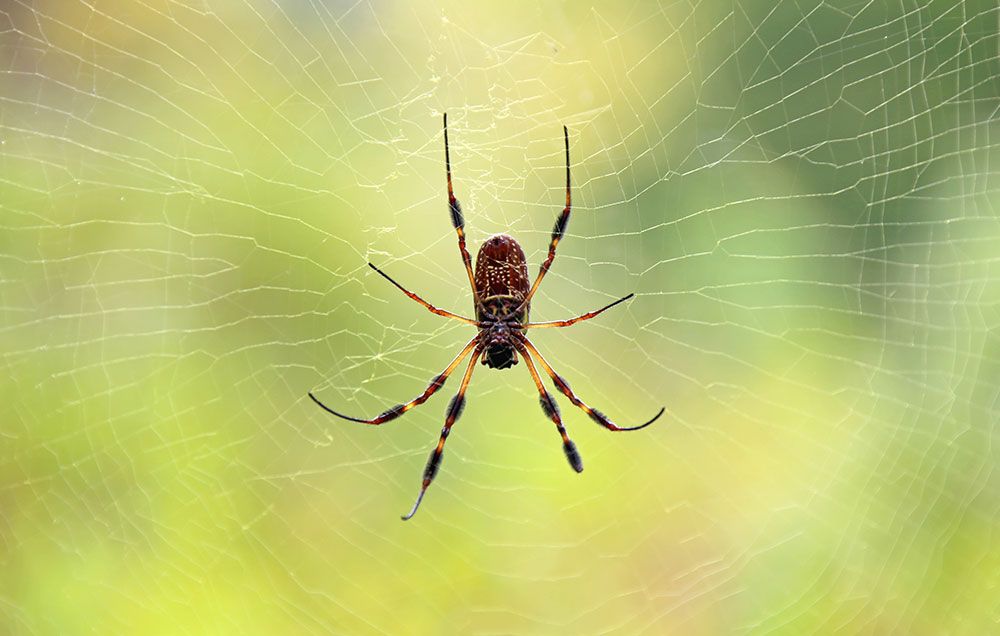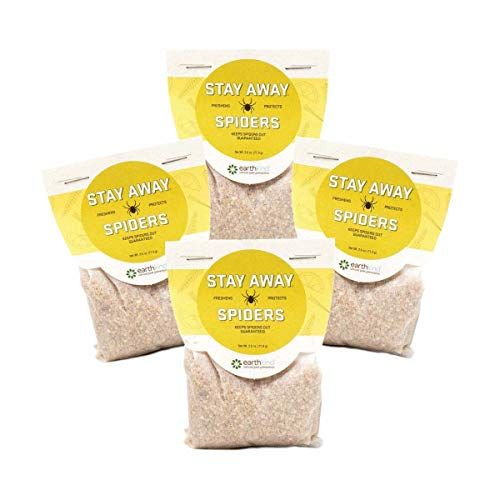While not all spiders are as big as Aragog—or as talented as Charlotte, for that matter—that doesn’t mean you should feel like you have to open up your home to eight-legged guests (especially since they rarely, if ever, bring hostess gifts). That said, the vast majority of spiders are not harmful to humans, and most are hoping you stay out of their way as much as you’re hoping they stay out of yours.
During certain times of year, however, you’re more likely to see spiders inside your home instead of outside, a.k.a. where they belong. Prime spider time? Autumn, when the weather begins to cool (guess it’s not all cute boots, cozy sweaters, and PSLs).
If finding a spider in your house really bugs you, take comfort in knowing you’re not alone. According to the American Psychiatric Association, one in ten people in the U.S. have phobias, and 40 percent of those phobias are related to spiders, mice, and other creepy crawlies.
“Pretty much every home has a spider in it, and most people don’t even know it because they don’t see it.”
But if you’re particularly squeamish about spiders, Kari Warberg Block, founder and CEO of EarthKind, a natural pest-repellent company, has some bad news for you. “Pretty much every home has a spider in it, and most people don’t even know it because they don’t see it,” she says.
But that doesn’t mean you’re already caught in a spider’s web. Instead, try out these best tips from experts on how to get rid of spiders in your home.
1. Keep your place clean.
Here’s the deal: Spiders eat bugs. Bugs like to gather around trash and other dirty areas. So if you have either of the above in your house, there’s a good chance that you’ll be seeing an itsy-bitsy spider very soon.
One of the best ways you can prevent spiders from getting in your house, according to Warberg Block, is by eliminating any potential locations where other pests (read: a spider’s food source) would want to hang out. This means taking out your garbage, doing your dishes regularly, and cleaning up any other piles of trash you might have lying around (all things you should probs be doing on the reg anyway). “They’ll go to somebody else’s house if you make it uninviting in yours,” Warberg Block explains.
If you do encounter some spider webs, Warberg Block suggests uses a spray of one-half cup water, one-half cup vinegar, two tablespoons of liquid dish soap, 20 drops of thyme oil to clean them up. Not only is it a more natural cleaning solution, but the thyme oil and liquid dish soap will help prevent spiders from wanting to build webs there in the future. (Genius, no?)
2. Make sure your walls are sealed.
Spiders and other pests can use pretty much any crack in your walls to get into your home, so use caulking to ensure that everything is sealed up tight. If you want to go super spider inspector on the situation, get out a magnifying glass to find the smallest openings in your walls and near your windows. Then, cover ’em up ASAP.
3. Weatherstrip your doors and windows.
Weatherstripping—a narrow piece of vinyl, rubber, felt or foam—is designed to seal any air gaps around the moveable objects that form the barrier between the inside and outside of your home. I’m talking about things like windows, AC units, and doors here. Not only does sealing any small opening help keep pests and insects out of your home, it also helps your house be more energy efficient, according to the Department of Energy. Win-freakin’-win, folks.
Check out even more ways to keep your home spider-free:
4. Plant bushes away from your house.
Spiders are always looking for food. Decorative plants or bushes in an outside flower bed attract bugs and insects, which means these also become sort of an all-you-can-eat buffet for your friendly neighborhood Spiderman (and Spidergirl, of course).
Make sure there’s at least a foot in between any plantings and your house if you want to keep what’s outside, outside and keep what’s inside reserved for creatures of the two and four-legged varieties.
5. Keep your lights on (inside).
According to Warberg Block, spiders also tend to gravitate toward places where they won’t be forced to deal with a ton of light. Think corners of closets or that one spot in the basement you never go.
That doesn’t mean you should just leave your lights on at all hours of the day. Just know you’ll be less likely to encounter an eight-legged intruder in well-lit areas.
6. But also turn your lights off (outside).
Again, I really can’t stress this enough: Spiders, like me around lunchtime, are mostly motivated by food. And outside lights tend to attract bugs—especially after dark—which makes them an ideal spot for a spider to call home. So unless you really need to the evening glow of porch lights or a lamp post, switch them off.
7. Leave the radio on when you go out of town.
This might sound a little ~out there~, but Warberg Block says leaving a radio on whenever you go out of town is both easy and surprisingly effective. Spiders hate vibrations because it interferes with their ability to hear pests in their webs (#themoreyouknow). In fact, it’s “like fingernails on a chalkboard” to them, she says. So the next time you go away for the weekend, tune into a radio station and tune out pests in your home.
8. Finally create your dream indoor herb garden.
If you’re anything like me, you’ve been telling yourself for years that you’re going to start an indoor herb garden. Well, in case you need another incentive to finally grow your own rosemary and mint, spiders hate both.
According to Warberg Block, spiders use their sense of smell (their spidey senses, if you will) to help them navigate around a space. If you have herbs with strong odors on your counter or in a backyard garden, it’s hard for spiders to to really find their way around, and they’ll be less inclined to set up shop in such a pungent place.
9. Get yourself a eucalyptus plant.
Speaking of scents that spiders hate, the distinct fresh and citrus smell of eucalyptus plants is one that spiders find overwhelming. Eucalyptus can be grown both indoors and outdoors, but if inside, it will need full sunlight in order to really thrive, according to The Spruce. You can also cut branches from the plant and dry them in closets or on any hook around your house if you really want to make sure your bases are covered. And by covered, I mean not covered with spiders.
10. Use essential oils to create both a calming and anti-spider atmosphere in your home.
If an herb garden or creating a forest of eucalyptus trees aren’t really an option in your home, you can always use essential oils. As mentioned above, rosemary, thyme, or mint are all pungent, herby odors that naturally repel spiders. Best part? These sweet scents will be extra relaxing for you, since you know your house is spider-free.
11. Set anti-spider pouches around your home.
You can make your own or order one from a company, but these are basically little sachets of all the herbs, scents, and essential oils that spiders hate. All you have to do is place them exactly in the nooks and crannies that spiders love and voilà!
Don’t wanna DIY? The Stay Away Spiders pouch from EarthKind is a mixture of rosemary oil, lemongrass oil, citronella oil, corn cob, almond oil, and sunflower oil.
12. If all else fails, you can always call a pest control company.
In general, Warberg Block advises against this option because you never know exactly what effects commercial sprays will have on the ecosystem around your home. Yes, the sprays will kill the spider, but if your place is messy, or if there are gaps in your walls, spiders are just going to keep coming back. Instead, Warberg Block suggests working to change what about your home is enticing to spiders before calling in the big guns.
13. Choose to live in harmony with the spiders in your home.
Almost all (99 percent, according to Warberg Block) of the spiders you ever encounter in your home will be non-threatening to humans. And even those that are poisonous aren’t going to bite or attack unless they are provoked or feel threatened. You could even say that most spiders are more scared of you than you need to be of them. So as long as you keep your place tidy, spiders are likely to keep to themselves and allow you to do the same.
“Here’s the thing about pests in general: They don’t need their own EPA, they don’t need their own government, they self-govern,” Warberg Block says. “They move into an area and it becomes like their territory. They don’t want any trouble. They just want to live in harmony and do their thing.”
Aw. Don’t you feel kinda bad for kicking them out now?
Source: Read Full Article



